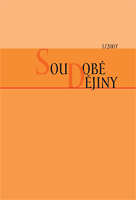Únor 1948 a vídeňští Češi: Příklad „péče o krajany v zahraničí“ v prvním roce komunistického režimu
The Communist Takeover and the Czechs of Vienna: An Example of “Concern for Expatriates” in the First Year of the Communist Regime
Author(s): Peter HallamaSubject(s): History
Published by: AV ČR - Akademie věd České republiky - Ústav pro soudobé dějiny
Summary/Abstract: This article by an Austrian political scientist and historian discusses how the Czechoslovak Communist regime infl uenced the political life of the Czech minority in Vienna. The author argues that the Czechoslovak Communist Party (CPCz) tried to infl uence the Czechs of Vienna right from the end of the Second World War through the Czechoslovak Ministry of Foreign Affairs, the Czechoslovak Ambassador to Austria, and the Foreign Czechoslovak Institute. After the Communists took power in February 1948 most of this work shifted to the central institutions of the Party, particularly the international department of the Central Committee, and direct contact was ensured by various emissaries sent from Prague to Vienna. The activity of the Vienna Czechs (and some Slovaks) after the war was conducted under the umbrella of the Central Committee of Czechoslovaks, in which four political parties on the Czechoslovak model and non-political associations were associated. The Communists among them formed a special section in the Communist Party of Austria, but were subordinate to the authority of their comrades in Prague. In February 1948 they endeavoured to copy the Czechoslovak Communist approach, and created a Central Action Committee of Czechs and Slovaks in Vienna, in which members of other parties were also represented. This step brought dissension into the ranks of the Czech minority, which was manifested clearly in the confl ict between Communists and Social Democrats over who would control the Czech minority press. The rising tensions were commented on by the Austrian and Czechoslovak news media. The CPCz, fearing its infl uence on the minority waning, intervened in favour of maintaining unity amongst them. In autumn 1948 Communist Party emissaries managed to stage the restoration of the paralyzed Tschechoslowakischer Zentralausschuß in Vienna, led by a Communist and an accommodating Social Democrat whom they were confi dent they could manipulate. The quarrels amongst the members of the Czech minority quickly worsened, however. The situation from the 1950s to the 1990s is concisely described by the author as “four decades of Cold War within one minority.”
Journal: Soudobé Dějiny
- Issue Year: XIV/2007
- Issue No: 04
- Page Range: 682-706
- Page Count: 25
- Language: Czech

